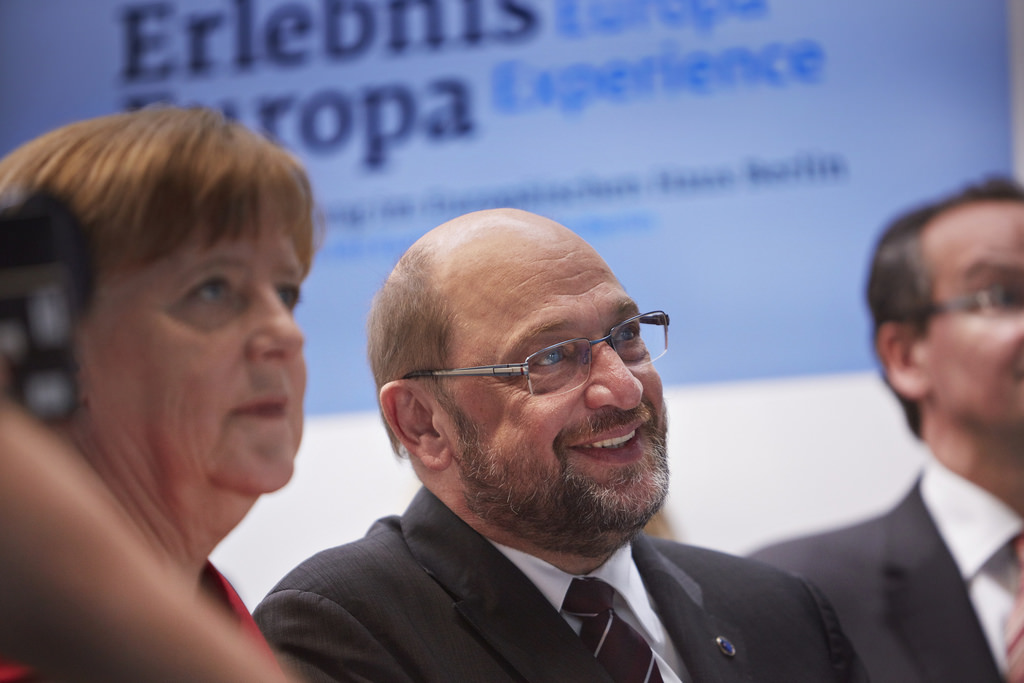German voters will choose a new chancellor on September 24 in an electoral contest pitting incumbent Christian Democrat Angela Merkel against Social Democrat Martin Schulz. After a brief surge in the polls earlier this year, Schulz’ SPD now looks set to lose the election to Merkel, trailing her CDU by about 15 percentage points in recent polls.
Four journalists steering the debate
Against this backdrop, the campaign’s only TV debate took place on September 03. Seen as the highlight of a previously rather lukewarm electoral contest, the debate was supposed to discuss four main topics in equal measure: migration, foreign policy, social justice, and internal security. Yet it was the first item on the list that took up nearly 60 of the debate’s 90 minutes.1
The four TV journalists hosting the programme – and particularly Claus Strunz of the Sat. 1 TV network – honed in on questions of immigration and integration, giving the discussion distinctly populist overtones.
It was above all the hosts who presented refugees and migrants as a threat to internal security and as a drain on Germany’s resources; who insinuated that Islam was inherently irreconcilable with German constitutional principles; and who claimed that Muslims were unwilling and unable to participate in German society – in spite of scientific evidence to the contrary.
Populist demeanour
In order to pressure the two candidates into conceding that politicians were unable to take effective control of migration and to ensure migrants’ integration, the hosts (again with Strunz in the lead) resorted to all available means. Shortly after the onset of the broadcast, Strunz appeared to deliberately falsify a quote by Martin Schulz, in which the SPD politician had stated that refugees were “more valuable than gold” – a fact that Schulz managed to call out.
Other misrepresentations went unquestioned, however – such as the claim that Germany was home to 226,000 people who had no legal right to stay and remained in the country only due to politicians’ failure to expulse them.2
One-sided discussion of migration
Summing up the TV event, the Süddeutsche Zeitung newspaper noted that it was as if the right-wing populist Alternative for Germany (AfD) had been a prominent guest in the studio. It also castigated the complete failure to discuss the issue of migration from any other but the most myopic of all perspectives.3
For instance, not one of the hosts’ questions dealt with the deplorable conditions faced by migrants in Libyan camps or with the deaths of thousands of men and women in the Mediterranean. Neither did anyone inquire about the hundreds of attacks on refugee shelters or the resurgence of right-wing terrorism plots in Germany.
Negative Muslim reactions
The reactions of the targeted ‘foreigners’ and ‘Muslims’ were, predictably, negative. Author and activist Imran Ayata summed up their sentiment when he asserted that the “clear winner” of the debate had been the AfD.4
The chairman of the Central Council of Muslims in Germany, Aiman Mazyek, noted that the hosts had fallen for the own “populist trap”. While moderator Claus Strunz had recently claimed that “populism is the Viagra of a flailing democracy”, Mazyek asserted that “populism is the Viagra of a flailing and ever more shallow media coverage”.5
Luay Mudhoon, renowned commentator on Islamic affairs, deemed the TV duel a “black day for German TV journalism” and bemoaned the “AfD-leaning leading questions”.6.
“Islam is a part of Germany”
Yet some Muslim observers chose to concentrate on the – rare – positive elements in the debate. The German-Turkish Journal welcomed the fact that both Chancellor Merkel and her challenger Martin Schulz had stressed the positive contributions of many Muslims to German society and that they had agreed to the statement that “Islam is a part of Germany”, albeit in a somewhat roundabout manner.7
This question – “Is Islam a part of Germany” or “Does Islam belong to Germany” (“Gehört der Islam zu Deutschland?”) – has been a staple of public controversy since a 2010 speech by then-President Christian Wulff. Wulff asserted that Islam was indeed part of Germany’s social fabric.
A question of belonging
Ever since, commentators have argued about whether ‘Islam’ can belong to Germany or whether only ‘Muslims’ can (but not ‘Islam’). The same discussion regularly resurfaces and never yields any conclusion, in part because the question is itself a non-starter and any answer to it always seems to degenerate into nothing more than semantic sophistries.8
Many have nevertheless rejected the notion of allowing either Islam or Muslims any part in German identity, citing the country’s inherent and primordial ‘Judeo-Christian’ make-up. (There is always something slightly odd about this claim, given that not too long ago Germany thoroughly erased Judaism from European lands by killing six million of its adherents.)
The Muslim ‘other’
Responding to these pressures, some Muslim voices seek to highlight that they are ‘more German’ than others, also in order to advance their own agendas. Ercan Karakoyun, leader of the Gülen movement in Germany, tweeted during the debate: “A form of Islam that can be reconciled with the Basic Law? There is one! #Gülen movement.”9
Ultimately, however, the enduring lesson of an evening spent in front of the television remains that people of Muslim faith are still seen as ‘other’ in significant parts of German society: ‘they’ really do not belong to ‘us’. The TV debate between Merkel and Schulz did nothing to challenge this perception and almost everything to reinforce it.
Sources
http://www.sueddeutsche.de/medien/tv-duell-die-angst-der-moderatoren-vor-dem-mob-1.3652046 ↩
http://www.spiegel.de/politik/deutschland/claus-strunz-internetnutzer-empoert-ueber-tv-duell-moderator-a-1165932.html ↩
http://www.sueddeutsche.de/medien/tv-duell-die-angst-der-moderatoren-vor-dem-mob-1.3652046 ↩
http://www.huffingtonpost.de/aiman-mazyek/merkel-schulz-muslime-_b_17907854.html ↩
https://twitter.com/Loay_Mudhoon/status/904426758325366785 ↩
https://dtj-online.de/angela-merkel-bekraeftigt-der-islam-gehoert-zu-deutschland-tv-duell-87597 ↩
An entire academic literature has focused on this debate. For an overview see Spenlen, Klaus (ed.) (2013), Gehört der Islam zu Deutschland? Fakten und Analysen zu einem Meinungsstreit. Düsseldorf: Düsseldorf University Press. ↩
https://twitter.com/ercankarakoyun/status/904417326442962944 ↩






